In the past few years, YouTubehas become a multimedia classifieds for guitarists. It’s opened doors for fingerstyle wizard Andy McKee, whose “Drifting” video has 44 million views, and ukulele phenom Jake Shimabukuro’s “Ukulele Weeps” video has 10 million views. And for Queen Extravaganza’s guitarists Tristan Avakian and Brian Gresh, YouTube might have assisted them in their best gig yet.
Queen Extravaganza is the official tribute band compiled with nine musicians—four lead singers, two guitarists, bassist, drummer, and keyboardist—to tour the US and Canada on the legacy of Queen’s expansive canon. The finalists were picked via fan vote on YouTube, and from there the band was assembled by Queen drummer Roger Taylor with help from Queen guitarist Brian May and Spike Edney—live keyboardist and musical director with Queen since 1984.
“I was blown away in shock!” says Queen Extravaganza guitarist Gresh about being chosen for the show. After 16 years of playing guitar, he is now living one of his wildest dreams: performing on a nationwide tour.“Once I calmed down a bit, I called my parents and they didn’t even believe me.” [Laughs.] Gresh has worked as a mechanical engineer at T.D. Williamson in Tulsa, Oklahoma, since 2006—performing with his band Megatron on the weekends ... that is, until he submitted his video audition for “Killer Queen.”
Queen Extravaganza’s other guitarist, Tristan Avakian, is much more familiar with the music business. He’s collaborated with Lauryn Hill, Mariah Carey, Biohazard, toured with Trans-Siberian Orchestra, and worked on Canada’s Rock of Ages and Queen’s We Will Rock You. “I feel honored that I made one of the two spots because Brian is my guitar hero—he’s a legend,” says Avakian. “I feel like Mark Wahlberg in Rock Star when he joins Steel Dragon and the band is doing the cool rocker poses and he can’t stop smirking. That’s how I feel every time I think about playing anything by Queen.”
“Tristan and Brian complement each other so well,” says May. “It’s great to see the organic interaction, the body language, and the evolution of their relationship—both those guys are so giving, share such a joy when playing, and are so individually charismatic that something special is bound to happen when they perform.”
Gresh and Avakian filled us in on their precarious auditions, what it was like to rehearse Queen songs in front of Taylor and May, and how gymnastics and guitar playing can go hand-and-hand. Bonus: Check out below for our special conversation with May.
How did you find out about
the Queen Extravaganza
contest?
Avakian: I actually heard about
it from a We Will Rock You fan. I
was initially reluctant because I’m
just not a big fan of the gladiatorial
competition in art or music.
Then I had a conversation with
Brian May and he let me know
about Marc Martel’s [Queen
Extravaganza lead singer] video
having millions of views and he
said it’d be a great thing to try out
for. I just realized that if someone
was going to represent Queen in
this capacity, I should at least tryout
since Queen’s music and Brian.
are so near and dear to my heart.
As the process and voting
was unfolding, what were
you thinking?
Gresh: Three days after my
upload I found out that I made
the second round and I had to
do another video—this time I
was told to do Queen’s “Keep
Yourself Alive.” I figured I’d go
all out and use all my moves.
Avakian: Since I was initially
apprehensive about this whole
process, I was relieved once I
saw quality players in the band
that could potentially be honoring
Queen. I actually started to
worry in the second round when
players like Steve Zukowsky,
who’s in the Queen tribute band
Sheer Heart Attack, and Richie
Castellano, who’s rhythm guitarist
and keyboardist in Blue
Öyster Cult, appeared. And, of
course, young Brian Gresh scared
the crap out of me, too [laughs].
Brian, describe your go-to
“moves” that you had in your
back pocket?
Gresh: [Laughs] I did a backflip
during the solo part of
“Keep Yourself Alive.” And
then during the live audition
of “One Vision,” I did another
flip, but I think I unplugged
Roy’s [another guitar finalist]
guitar chord when I landed so
I’m still sorry about that.
Have you broken any bones or
guitars doing this?
Gresh: I haven’t broken any
bones, but I did break a 0-
eBay guitar when I didn’t
get enough height and it was
either my face or the guitar.
Thankfully the guitar sacrificed
itself and took the fall [laughs].
How did you ever think to do
backflips while playing guitar?
Gresh: I remember having a
dream when I was in fifth grade
of a band that had their guitarists
doing flips during solos.
The biggest part of learning to
do the flip with a guitar was
not having any arm lift because
you rely a lot on the momentum
of your arms going up to
get the necessary height for the
flip, so I had to build up my
leg strength. The first live performance
that I did it was my
high school’s jazz band concert
my senior year—I think I really
shocked a lot of people doing it
there [laughs].
Tristan, did We Will Rock
You prepare you for this gig
or was it almost a handicap
because you were so close to
the material?
Avakian: Honestly, it was a
liability. To fit within the format
of the musical, music was
chopped up, played in different
keys, even within the same
songs because two different
characters were singing it—a
villain and a hero—and everything
is mixed together in a way
that benefited the show and
onstage performance. Rarely
did we play the material in
standard, true-to-form package,
which will happen throughout
the Queen Extravaganza where
we’ll reference their early live
days as a feral four-piece band.
How did the final auditions in
L.A. work out?
Gresh: Everyone was nice and
didn’t have any egos. I was the
only guy that hadn’t ever gone
through a professional audition, but everyone
was very professional. We
actually had to work together
throughout the finals because
they grouped us into pairs of
guitarists with the other contestants
making different band
combinations. Then, we had 90
minutes to come together and
figure out who would take what
leads and rhythms, who would
stay back during certain parts,
and when we would synchronize
our parts for a harmony effect.
We had to be a team to survive.
Avakian: I wish I knew
[laughs]… I had done a show
with Night Ranger in Louisiana
the night before and the only
flight that would get me out of
Louisiana and to L.A. in time
for the auditions was going
through the East Coast first.
I was in a bleary-eyed, Keith
Richards haze without the substance
abuse by the time I went
to the live auditions.
Caption here
Brian May: Working For the Greater Song
Queen guitarist Brian May took a hands-on approach to mentoring Brian Gresh and Taylor Avakian as the two pickers prepared for the Queen Extravaganza. We asked May what it was like to see his music through new eyes (and fingers).
What sort of input did you have on the selection process for the Queen Extravaganza?This is Roger’s baby, but because he’s hiring guitarists I can’t stray too far. [Laughs.] I went through some of the videos and made notes on the players that I really liked and felt could do the music, tour, and overall production at a high level. Queen Extravaganza is a much more stripped-down, band-only endeavor compared to We Will Rock You. Is this what you thought it would be?
We Will Rock You tells a different story and is part of a bigger overall production of music, dance, and visual stimulation. I think with Queen Extravaganza the music is the central focus since the songs will be played in their entirety. In the very beginning, I thought it would be very interesting for it to be big and orchestral—it would still rock with a traditional band, but with a full-scale orchestra bringing all of our compositions to life … [laughs] much more extravagant if you will, but Roger became very infused with the idea that the band would be like us in the early days. What was it like for you when you saw Tristan and Brian playing the riffs and songs that you spent countless hours creating and recording with Queen?
I just enjoyed it thoroughly. In the beginning of We Will Rock You, I tended to worry quite a bit about how the songs and guitar parts were not done right. I actually would get quite nitpicky about the details and how every note needed to sound. I’ve learned over the past 10 years that it’s good to have a light touch when dealing with art and music. Did you give them any specific advice beyond that when they perform Queen’s music and your riffs?
What I tried to drive home to Tristan and Brian is that I wanted them to bring themselves to it—I didn’t want them to be carbon copies of me or my playing. Another thing I was keen on was encouraging and making sure they felt comfortable in letting the band organically evolve as a whole throughout the rehearsal process and eventually on tour. If and when I’m giving advice to guitarists in the situation of Tristan or Brian, one of the things I always say is if you’re in any way doubting what to play, listen to the vocals because everything revolves around the voices and harmonies. Even when I was coming up with these songs and writing these licks I would always ask myself, “Does this make sense? Does this work for the greater song?” In those periods, I learned restraint—a great tool for guitarists and writers. Were you able to talk with the guys about gear or give them any suggestions on their setup for the tour?
[Laughs.] For me, it’s simple—if it sounds good and sounds right then it is right. Both those guys have their sound put together already, so it’s not something I worry about terribly, but we did all play through new handwired AC30 amps for the rehearsals and the American Idol performance, which was a first for me. No matter what, you get something special out of any Vox—especially an AC30. They’re just made different—even to this day—from most any other amp as a class A, valve amp that’s hi-fi sounding. With the negative feedback taken off that it creates a real rich, smoothness that edges its way into overdriven tones or distortion. What are you goals and expectations that the Queen Extravaganza does for you, the music, and the band?
I would like to see it become a thing of itself—maybe like my orchestral idea years ago. For me, the most exciting part is seeing what these fine musicians and singers will do with our music and compositions because it’s inevitable that they’ll put their own stamp and thumbprint on it. I hope they absorb and take enough of our legacy—if there is such a thing as a legacy—and do their own thing with it and form their own identity that’s new, exciting, and that has to be seen and heard.
Gresh: It was surreal playing in front of Brian and Roger, they're living legends. The band had a really fantastic moment when we played "Lazing on a Sunday Afternoon" in front of them and Spike Edney. We had never played the song before and the keyboardist hit the opening chords and the whole band followed; we had not even been scheduled to rehearse it yet. Tristan and I whispered to each other during the first half of the song and we divvied the guitar solo- he would take the top harmony and I decided on the middle. So when the song got the the guitar solo outro, we played that and we were shocked how good it sounded off the bat. Then we saw Brian May's eyes and mouth open in enjoyment and excitement. That rehearsal was one of the greatest moments in my life [laughs].
Avakian:I’ve played in front of the guys before, so this time it wasn’t so terrifying. When I tried out for We Will Rock You I was nervous, so to center myself I took some Lego men and set them in front of me. Then I gave each of them a name— Roger, Brian, John, and Freddie … I think I even gave Freddie a little crown and cape. I did it as a joke—as a placeholder for the real thing so I could see the humor in the situation and not tense up when it came time for the auditions. It helped me laugh at my fear and harness it. What was your time like with Brian May?
Gresh:It was like an out-of-body experience meeting Mr. May. [Laughs.] He’s so humble, soft-spoken, and such a sweet man to be around. It was a trip to have Brian May check out my pedalboard. And then he was really checking out our Vox AC30s and he made sure the Fryer/Brian May Treble Boosters were up to snuff, too. We also talked about his unusual phrasing and harmonies on the guitar and how the clarinet heavily influenced him when composing some of his guitar parts for Queen like in “Good Company.”
Avakian: The invaluable lesson I’ve gotten from my time with Brian at We Will Rock You and again here with Queen Extravaganza is when you’re standing next to him and see him play it’s like a live feed coming out of his heart and soul. It’s astonishing. Any time Brian is there in person, it’s a shot in the arm. His aura and personality just lights up the room and makes everyone push that much harder. What has been the toughest song to learn?
Gresh: I'd say the songs with the three part guitar harmonies such as Killer Queen and Keep Yourself Alive. It is difficult figuring out the unique Brian May harmonies without hearing the tracks divided out. We had to learn them with all three parts mixed together since they were all bounced to one track during the production of the albums.
Avakian: “Stone Cold Crazy” is damn tricky because it’s quite quick. The main riff is a mover—I’ve yet to nail down the picking 100 percent so I’m correctly alternate picking and doing pull-offs in the right spots. There’s a string jump in between the end of the riff and when it starts over again so you really have to nail down the exact up-and-down picking motions to be in the best position to catch the riff again. When the riff is done right it’s tight and explosive. What is your favorite Queen song and Brian May solo?
Gresh: “Death on Two Legs” is probably one of my all-time favorite songs, and as a guitarist, “Lazing on a Sunday Afternoon” and “Killer Queen” are definitely stand-out Brian May solos for me. I really like "Killer Queen" because of its melody, harmony, and feel- it starts on the D minor melody which then repeats in C minor. Then it climbs to the octave up C minor for a new dramatic melody which is then supported by all the beautiful counter-part harmonies.
Avakian: That’s easy—“The Prophet’s Song.” It’s visionary. Beyond the musical genius Brian put together and Freddie’s magnificent performance, Brian’s lyrics are still so contemporary and thought provoking. His phrasing, vibrato, and crisp note articulation is unparalleled in that song. Let’s talk gear. What type of gear were you using during the video submissions and then during the live final auditions?
Avakian: I used my Tom Anderson Classic S-style guitar for the submission videos. This will horrify the purists—I was using Guitar Rig 3 for those videos in the preset called Brian’s Vision. I was using all the wrong things—a Strat with heavy strings and high action and plugging into a computer. [Laughs.] For the live audition I used a Vox AC30 and one of the Fryer/Brian May Treble Booster pedals. I used some tricks that can get you in Brian’s tonal neighborhood—like playing mainly in the bridge-middle position. In a traditional Strat setup, the pickups aren’t wired in series, but you just gain-it-up somewhere and you’ll get that jangly bite like Brian.
Gresh: I was using my homemade parts guitar that is my interpretation of a 1986 Ibanez Roadstar II. The only thing original on the guitar is the Ibanez body—I got the neck from Warmoth, DiMarzio pickups from eBay, and everything else is stuff I’ve handpicked and pieced together. I customized the wiring so the guitar only has a volume knob and kill switch. From there the signal went into my pedalboard, which has a Boss OS-2 for the heavier, overdriven tones, and then for songs like “Keep Yourself Alive” I used a MXR EVH Phase and a DigiTech Harmony Man for the harmonized and layered May riffs. I used my kit-built 100-watt CeriaTone 1969 Marshall Plexi, but everything it came with has been replaced except some of the resistors. The amp has my own custom handmade attenuator—it really helps me heat the amp up and get that early VH tone much in the same way Eddie did with the light dimmer Variac variable attenuator.
Brian Gresh's Gear
Guitars’80s Ibanez Roadster body with Warmoth neck, Fender bridge, DiMarzio pickups, EVH Wolfgang, Martin OMCX1KE.
Amps
Handwired Vox AC30 (mic’d with SM57 on front and
Sennheiser 421 in back of cab)
Effects
MXR EVH Phase 90,
Boss RV-5 Reverb,
DOD FX40B EQ,
DigiTech Harmony Man,
Voodoo Lab Pedal Power 2 Plus,
Dunlop 535Q Cry Baby wah,
Boss TU-2 Tuner.
Strings and Picks
D’Addario Nickel Super Light 9–42 (strings),
Dunlop Jazz III Round 1.10mm (picks)
Tristan Avakian's Gear
Guitars
Brian May Guitars Antique Cherry Red Special with the Fryer/Brian May Touring Edition
Treble Booster taped to strap going into the wireless transmitter, Takamine 12-string acoustic-electric,
Two Takamine G Series acoustic-electric models.
Amps
Handwired Vox AC30 (mic’d with SM57 on front and
Sennheiser 421 in back of cab)
Effects
Boss TU-2 Tuner,
Xotic RC Booster,
TC Electronic Vortex Flanger,
Tech 21 Boost Chorus.
Strings and Picks
DR Strings Tite-Fit 9.5–44 (electric),
DR Strings Phosphor Bronze 11–50 (acoustic),
DR Strings Phosphor Bronze 10–48; 10–28 (12-string),
Herco Nylon Medium (picks/acoustic),
Dunlop Tortex .88 mm (picks/electric),
Sixpence (for picking/electric)
Gresh: I’ll be sticking with my personal guitars, but the show is providing us some really greatsounding Vox AC30 handwired amps. I’m really happy with using my own pedalboard with a MXR EVH Phase 90, Boss RV-5 Reverb, DOD FX40B EQ, DigiTech Harmony Man, Voodoo Lab Pedal Power 2 Plus, Dunlop 535Q Cry Baby wah, and Boss TU-2 Tuner.
Avakian: I actually have two Brian May Guitars Antique Cherry Red Specials—one of which will have the Fryer/Brian May Treble Booster on the strap in the same way Brian does it. I tried using the booster in the traditional signal path, but it just sounds and reacts the best when it’s the first thing in the chain. Plus, if it’s good enough for Brian, it’s sure as hell good enough for me. [Laughs.] I’m using a sixpence —the serrated edge of the coin—because it grabs the string and gives it a bit of rasp. I like using it on cleans, because the only way to get a clean sound with this rig is to turn the guitar’s volume knob almost all the way down and the coin puts back the attack and sparkle the pot rolls off. For leads or fast alternate picking I’ll go to a Dunlop .88 mm green Tortex pick. What’s the thing that you’re most looking forward to during the entire Queen Extravaganza tour?
Gresh: I’ve never been on a tour bus so it’ll be a thrill to see parts of the US and Canada I’ve never visited before. The thing I’ve seen and like to apply to myself is that Brian and even Tristan are so confident in their abilities—they never play anything wrong or out of place, and even if they do it still works and sounds natural. [Laughs.] Bottom line: I just want to walk out of this a more, well-rounded guitarist with realworld experiences.
Avakian: I want to emerge a better musician and artist. It’ll be a cleansing of sorts because this music is very nourishing to hear and play. I’m really itching to sing my backup parts because this material has so many great, harmonious parts. My voice is a muscle and I’ll be working it out every day on the tour so when I finish I’ll be able to really dig into my own recording projects and have a better overall voice thanks to this opportunity.




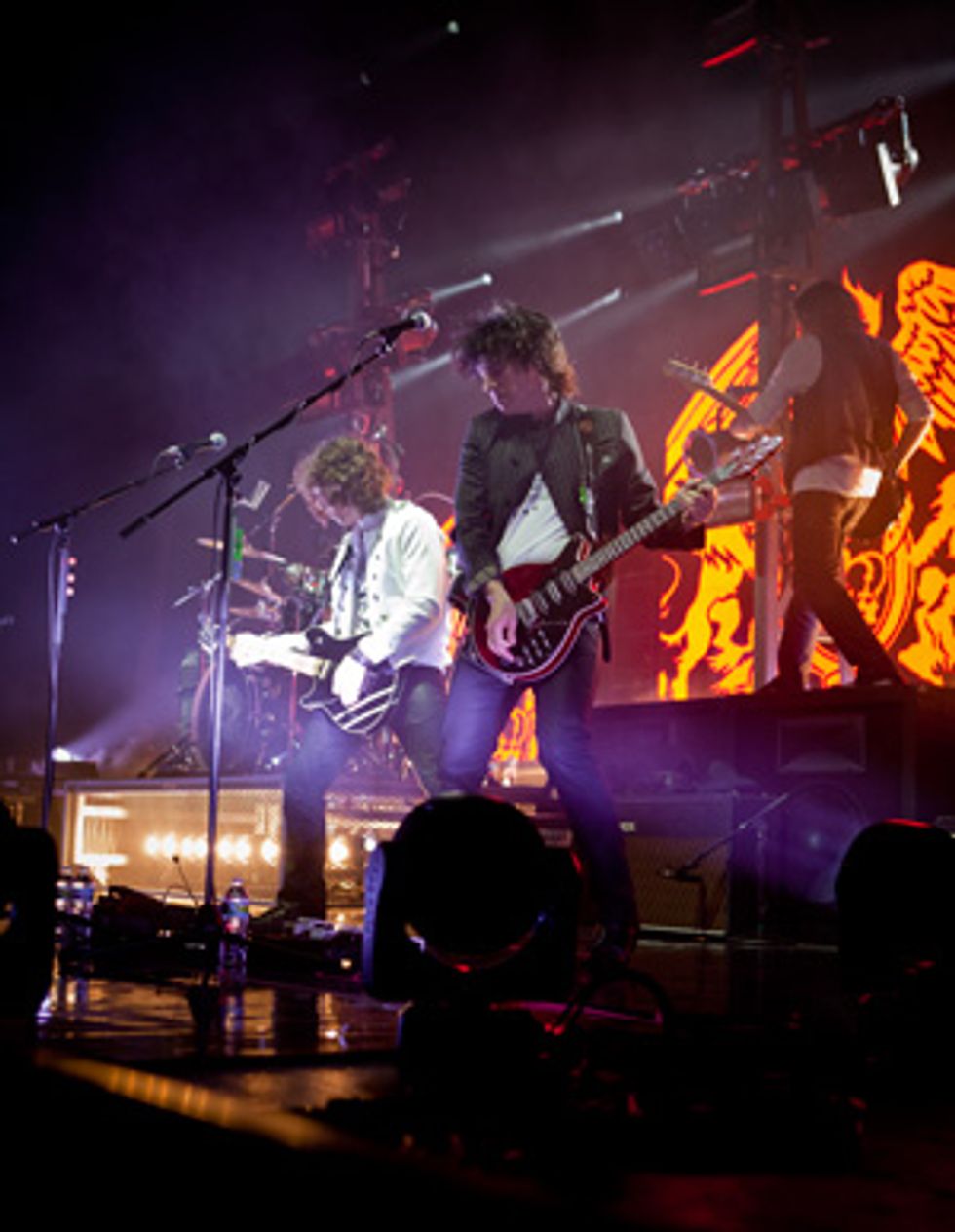
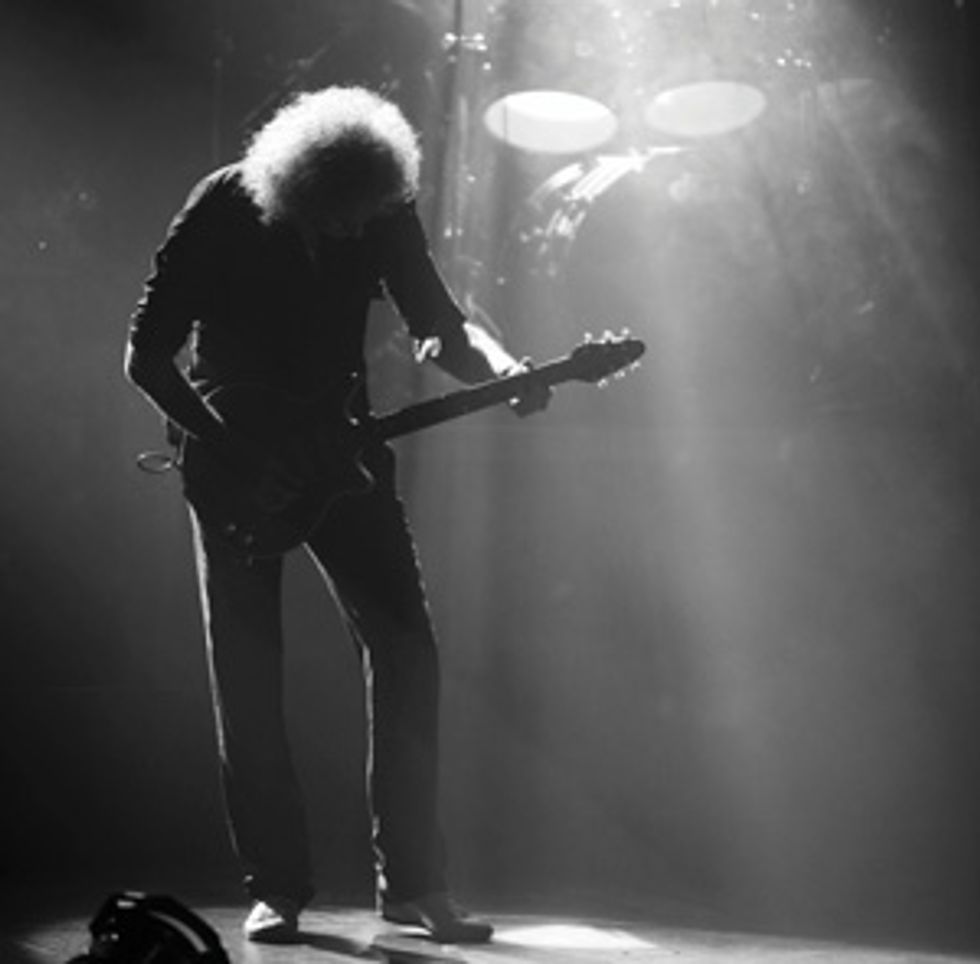
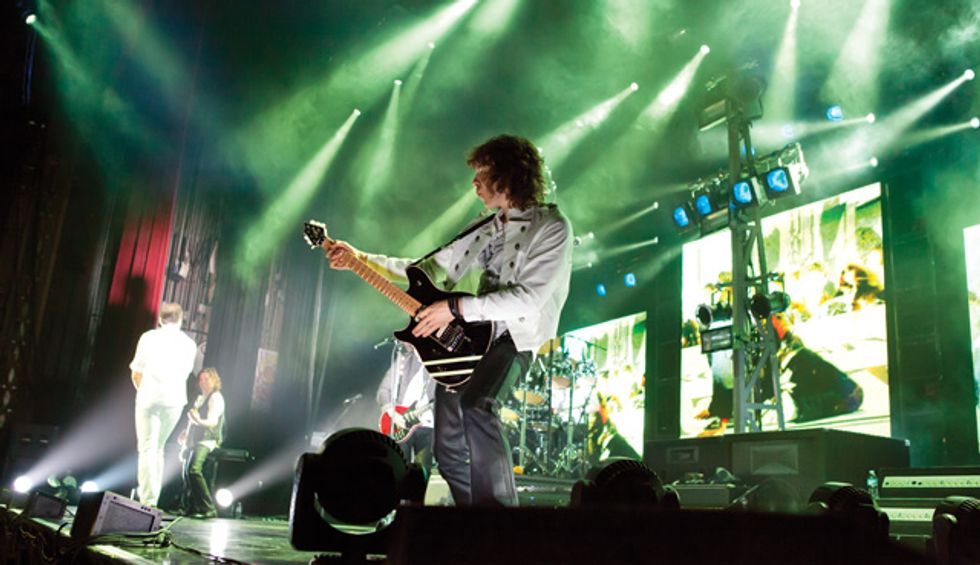





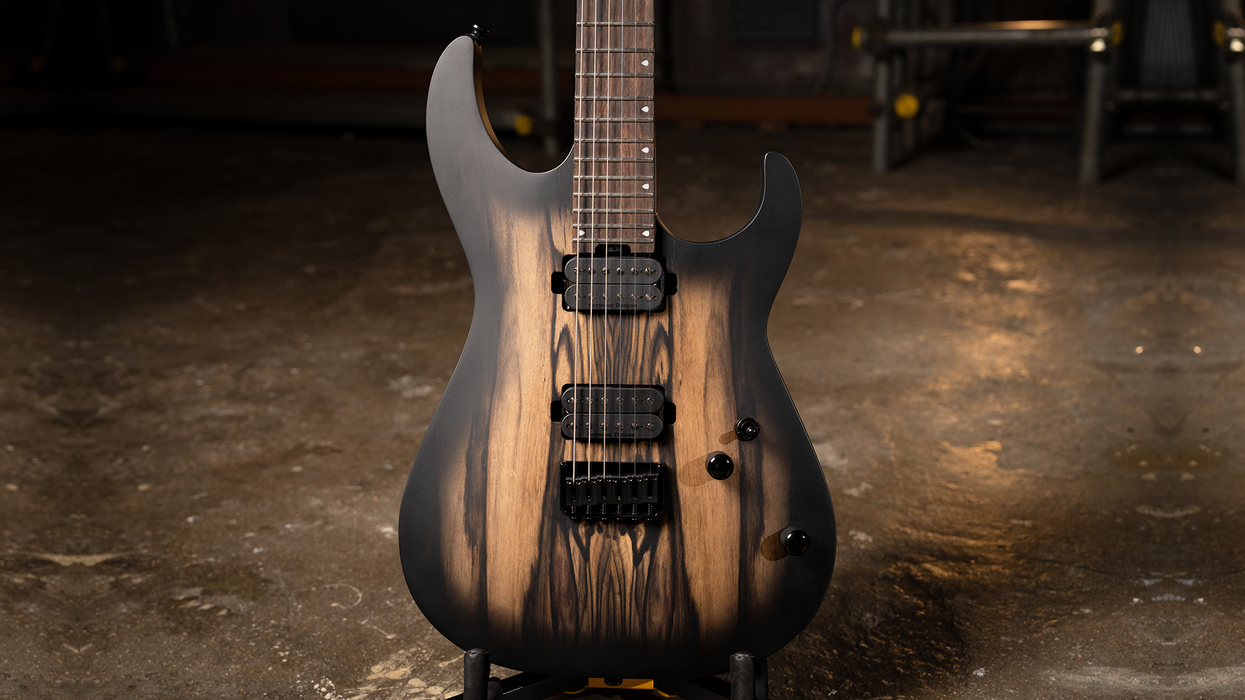

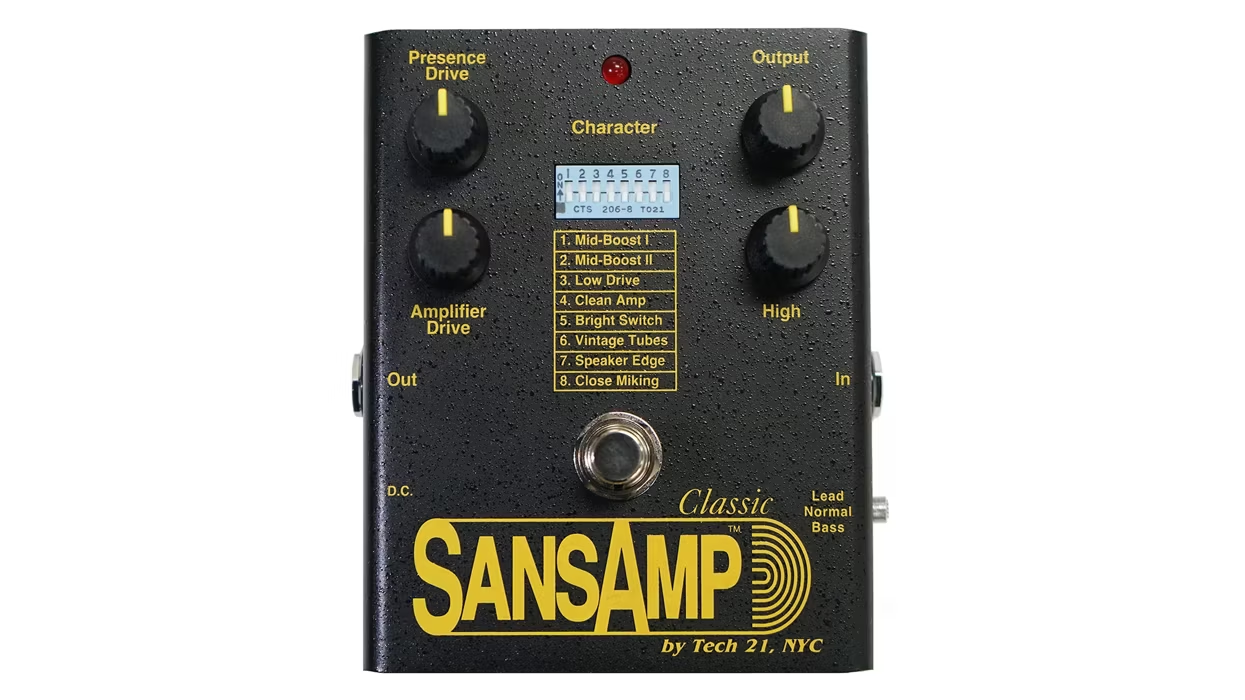
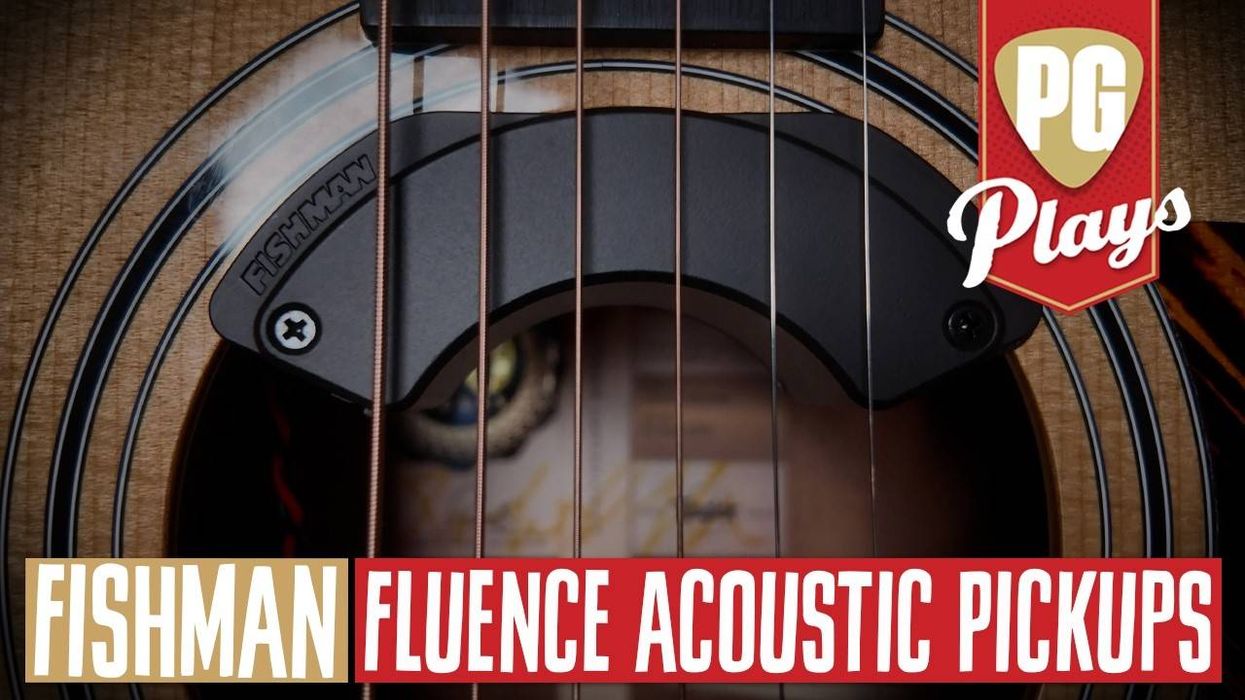
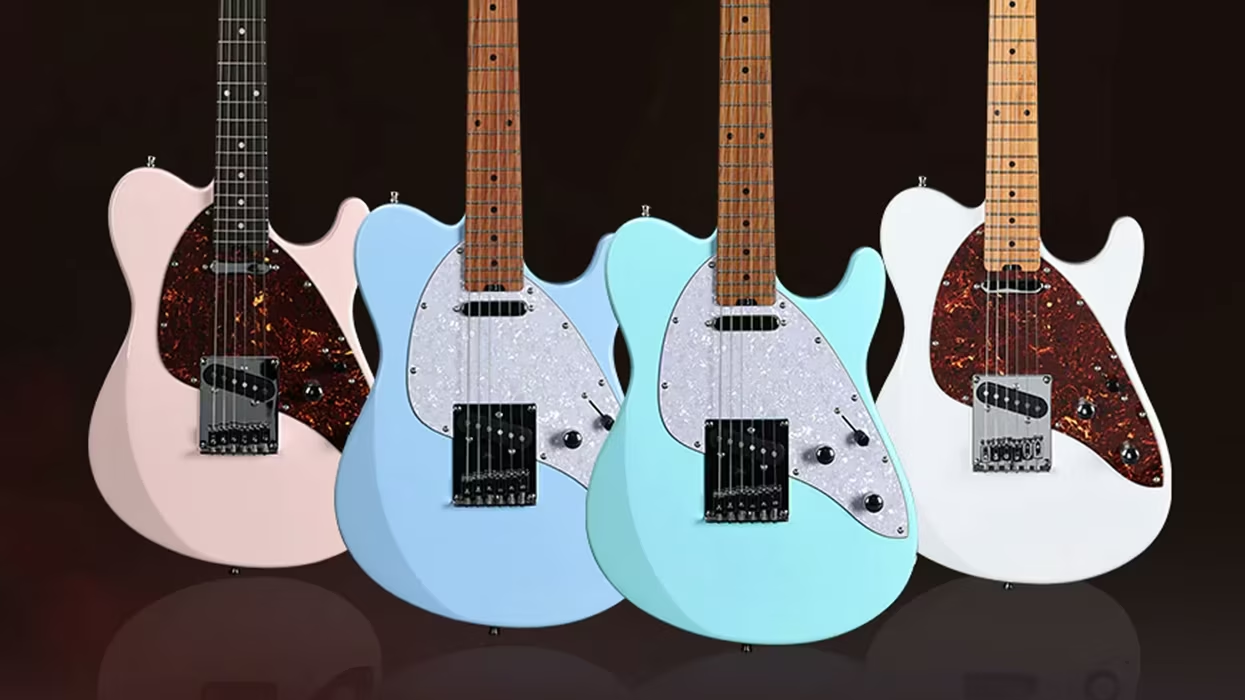
![Rig Rundown: Russian Circles’ Mike Sullivan [2025]](https://www.premierguitar.com/media-library/youtube.jpg?id=62303631&width=1245&height=700&quality=70&coordinates=0%2C0%2C0%2C0)










![Rig Rundown: AFI [2025]](https://www.premierguitar.com/media-library/youtube.jpg?id=62064741&width=1245&height=700&quality=70&coordinates=0%2C0%2C0%2C0)




















 Zach loves his Sovtek Mig 60 head, which he plays through a cab he built himself at a pipe-organ shop in Denver. Every glue joint is lined with thin leather for maximum air tightness, and it’s stocked with Celestion G12M Greenback speakers.
Zach loves his Sovtek Mig 60 head, which he plays through a cab he built himself at a pipe-organ shop in Denver. Every glue joint is lined with thin leather for maximum air tightness, and it’s stocked with Celestion G12M Greenback speakers.











